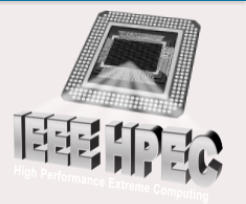IEEE HPEC 2021 Presentation
Tue 21 September 2021 by Dr. Dirk Colbry
Nicholas Grabill, Kai Pinckard and I presented our most recent work on the SEE-Segment Project at the IEEE HPEC Converence. This is work that both students conducted during the summer of 2020 as part of the XSEDE Empower program.
Scaling of Evolutionary Search of Algorithm Space to Speed-Up Scientific ImageUnderstanding Workflows
Scientific image understanding is an integral part of many research workflows. Studies in everything from self-driving cars to the makeup of cells rely on image understanding through computer vision techniques. Unfortunately, almost every new scientific question requires a new algorithm to be developed by researchers. Exploring the possible algorithms (and their parameters) to find one that fits a particular scientific problem requires time and a broad understanding of the many options available. For this reason, many scientists resort to making measurements "by hand" instead of making the considerable investment required to develop a tool that can automate their specialized workflow. This paper explores the scaling of a tool (SEE-Segment) that searches the "algorithm space" of possible image segmentation algorithms and their parameters for solutions to unique scientific problems. The goal is to have the researchers do this manual annotation of their images ("measure by hand") using a Graphical User Interface front end while the SEE-Segment program searches through the algorithms and their parameters on the back end. In the best case, the SEE-Segment tool finds a good candidate algorithm that can be used on the remaining images in the researcher's data-set. In the worst case, the researchers annotate their images as they would without the tool. Unfortunately, the search space for different segmentation algorithms and their parameters is quite large and non-linear. This research leverages the pleasantly parallel nature of Genetic Algorithms and explores the use of large-scale computing to speed up the search both on a local HPC and on the cloud using Kubernetes.
